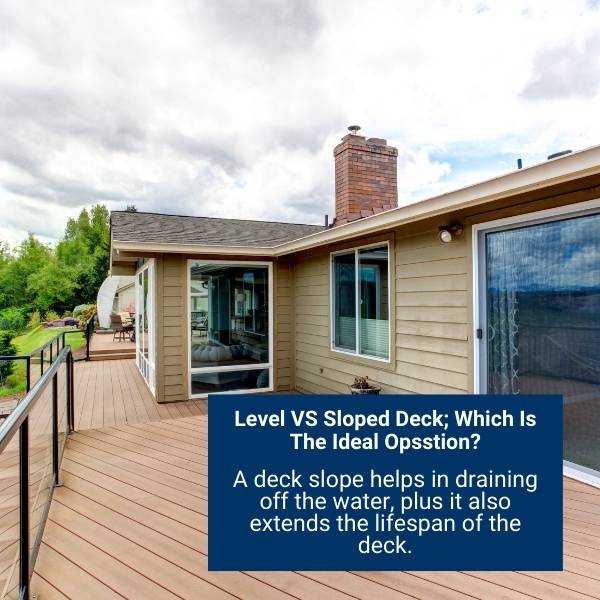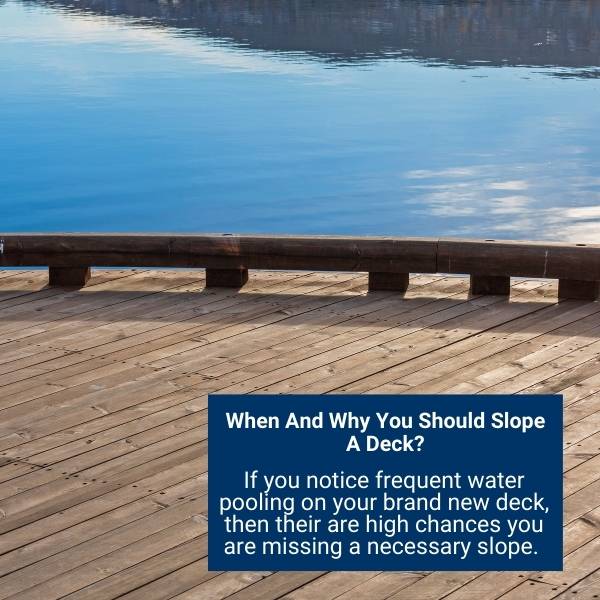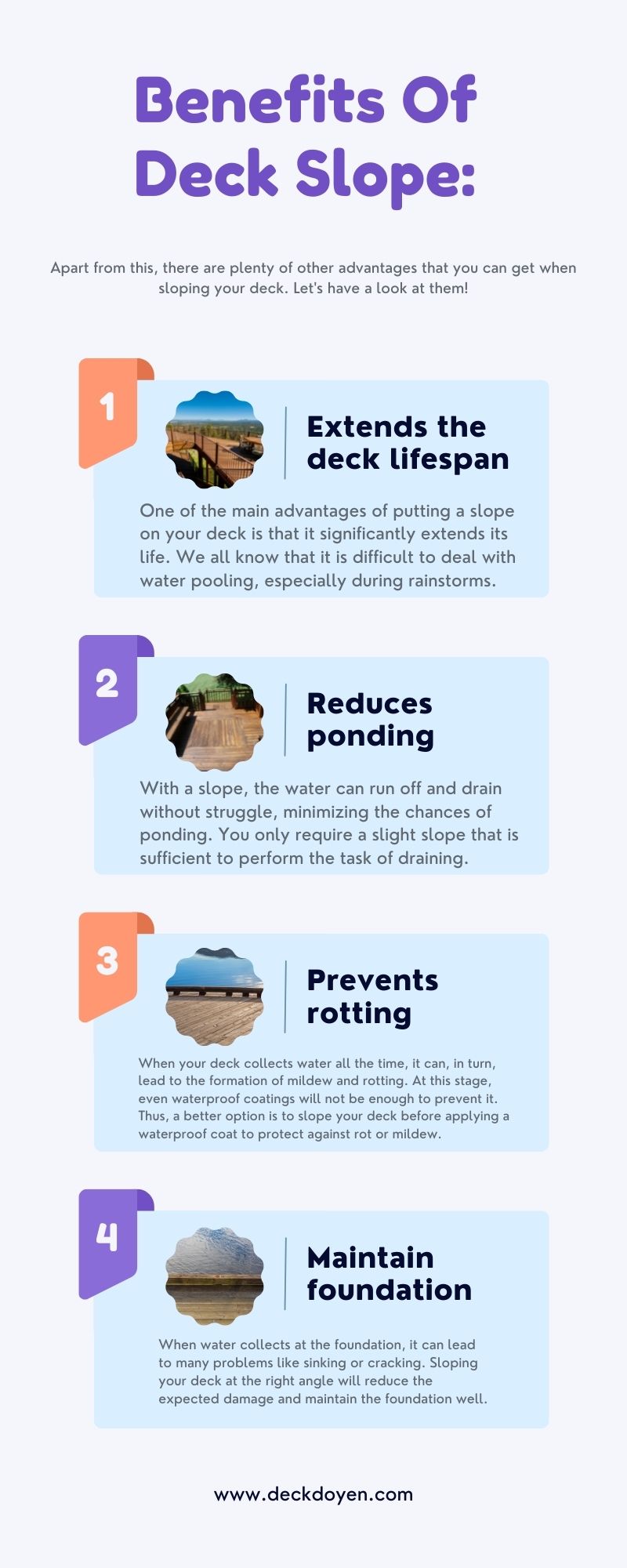If you are unfamiliar with the world of outdoor living, you will have a lot of queries before you install your deck. After all, everyone wants their deck to be flawless and everlasting.
One such question that homeowners often ask is whether a deck should be level or sloped?
Construction experts advise that your deck should be slightly sloped and never be level with your home. Ideally, deck boards should have a slope of about 1/8th per foot. It will allow the water to drain off with ease during extreme weather. The slope is almost unnoticeable if you walk or stand on the deck.
When it comes to planning your deck, you need to know what will work the best for you. In this article, you will get to know the reasons you might want to slope your deck and if it is necessary or not.
Also Read: How To Protect Your Deck From The Weather?
Level VS Sloped Deck; Which Is The Ideal Option?
Decks are getting in trend over the recent years as they are the perfect addition to your outdoor space. However, many people are not fully aware of the technicalities involved while building one for themselves. One such question that many homeowners often get confused about is whether or not the deck should be level with the home.

Experts suggest that your deck should never be level with your home. It is crucial to avoid the most occurring problem: water damage that you might face with an outdoor space. When the deck is the same height as your house, the water will have an easy excess inside and cause destruction.
Moreover, water can also weaken the foundation of your wooden decks, resulting in corrosion and rotting. Thus, it gets much more challenging to maintain them with a level decking. A deck slope helps in draining off the water, plus it also extends the lifespan of the deck.
Also Read: Best Wood For Decking
When And Why You Should Slope A Deck?
Most of the time, it is always better to have a deck slope as it allows you to avoid any issues that otherwise are hard to control. If you notice frequent water pooling on your brand new deck, then their are high chances you are missing a necessary slope. A slight slope lets the water gradually run off the boards rather than getting absorbed into the boards and weakening them over the longer run.

Ideally, your deck slope should be about every 1/8th of an inch so water can drain off better. However, when you construct a deck with gapping between the boards, there isn’t much need to slope the deck. The gaps are enough to allow the water runoff, and they won’t get collected on the deck. Thus, it also depends upon the material you use for the deck and the spacing in between the boards if you should consider sloping your deck.
Also Read: Deck Blocks vs. Post Holes: Which One To Use And Where?
Benefits Of Deck Slope:
The deck slope is usually a smaller measurement that is not noticeable. But, it can perform the duty of water draining effectively. Apart from this, there are plenty of other advantages that you can get when sloping your deck. Let’s have a look at them!

Extends The Deck Lifespan:
One of the main advantages of putting a slope on your deck is that it significantly extends its life. We all know that it is difficult to deal with water pooling, especially during rainstorms. So, when the water remains collected on the deck surface and doesn’t slide off the surface, it can weaken the structure.
Moreover, when your deck is attached directly to the home, it can become even more necessary to keep the moisture away. It might cause irreparable damage, and you do not want that to happen. Thus a deck slope not only prolongs the lifespan of your deck it also makes it easy to keep it well-maintained.
Reduces Ponding:
Many homeowners struggle with water collection on their decks which ultimately becomes a big pool. If you are also experiencing such a situation, you must consider sloping your deck. With a slope, the water can run off and drain without struggle, minimizing the chances of ponding. You only require a slight slope that is sufficient to perform the task of draining.
Many builders recommend sloping the deck about 1-4th to 1/8th of an inch for every foot of decking. The difference is not drastic, and you might not even feel anything when you stand on the surface, but it will reduce the pooling to a great extent.
Prevents Rotting:
When your deck collects water all the time, it can, in turn, lead to the formation of mildew and rotting. At this stage, even waterproof coatings will not be enough to prevent it. Thus, a better option is to slope your deck before applying a waterproof coat to protect against rot or mildew.
As rot can make your deck prone to breakage, making it dangerous for you or anyone else to stand on it. Often, it can be a little hard to notice rotting. Nevertheless, discoloration of the wood is a strong indicator of water damage that initiates rot.
Also Read: Are Decking Screws Rust Proof
Maintain Foundation:
Over time, water pooling can leave a lasting effect on your deck’s foundation, turning it weak. With level decks or improperly sloped decks, there is a high risk that water may drain in the direction of your home. When water collects at the foundation, it can lead to many problems like sinking or cracking. Sloping your deck at the right angle will reduce the expected damage and maintain the foundation well.
However, while sloping your deck, it is advisable to slope it away from your home so that no foundation issue arises in the future.
Final Thoughts:
A deck slope helps avoid water pooling that can prove dangerous for decking, especially wooden decks. If you possess one with decking boards, you should not worry about drainage as the gaps in between are sufficient enough for the job. But, if you are experiencing the issue of water collection on your deck, you need to consider the sloping option. In addition, it also prevents rotting, maintains the structure, and prolongs the life of your deck.

